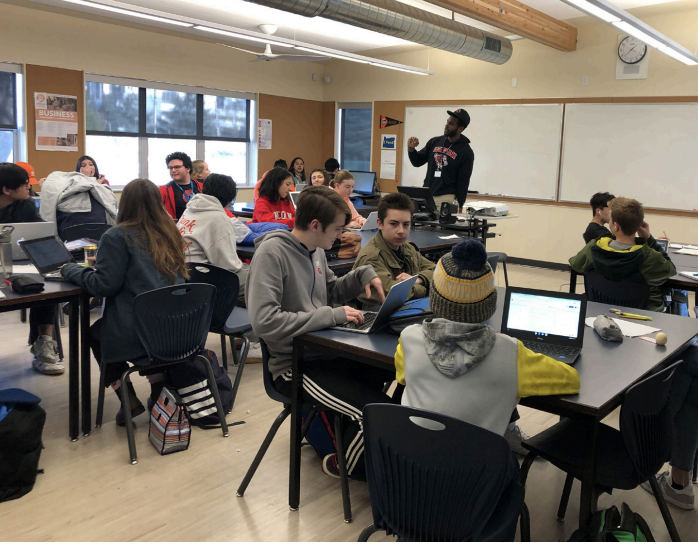Student works to mandate Ethnic Studies class for PPS freshmen
Ryan McCants teaches a US History: Ethnic Studies class during third period in portable 1B. Ethnic Studies is now mandated for freshmen at Lincoln, but some educators and students hope the curriculum will expand to all of PPS and Oregon.
The consequence of the single story is that it robs people of dignity. It makes our recognition of our equal humanity difficult and it emphasizes that we are different rather than how we are similar,” said Chimamanda Ngozi Adichie in her 2009 Ted Talk The Danger of A Single Story.
The dangers of a single story are embedded in American culture. Rooted from a past of unjust trials and heterosexual, male, European supremacy, the United States has led on a constant hazing over equity and equality for all.
Even in the wake of growing movements such as Black Lives Matter, #MeToo and others, around the nation white supremacist groups continue to chant “You will not replace us!”
Some of these actions are breathing right here in downtown Portland.
The Oregon Department of Education appointed an advisory group of men and women with a passion for educating the youth to develop statewide ethnic studies standards which is to be adopted into all existing social study standards for all public schools in Oregon, grades kindergarten through 12.
“[The new ethnic study will] enable all students to gain a wholesome, wholistic, inclusive, and diverse understanding of their county and communities,” says experienced educator, Helen Ying, a passionate member of the advisory group.
The advisory group is made up of a wide array of people. Representatives are plucked from different ethnic, sexual, gendered and disabled backgrounds into commissions to represent multiple angles and ensure accuracy for the material. In the representation of her Kenyan heritage and L.G.B.T.Q.I.A.+ community, Lincoln senior Tanya Munyua was selected as one of these special representatives in late November of 2018.
“My passion to become a member of the curriculum panel came from the lack of knowledge I saw of people falling into a single narrative,” says Munyua.
Munyua enlightened the community when giving her Chimamanda Ngozi Adichie-influenced speech, The Danger of A Single Narrative, addressing misconceptions of cultures and countries beyond the westernized world.
In 2017, the advisory group accomplished their first major step when a bill was passed by Governor Kate Brown, that would require all Oregon Schools, grades kindergarten through senior year of high school, to take an ethnic study course each year. This made Oregon the first state to do so.
Since the passing of the bill, the advisory group has worked to create the ethnic study standards.
“[We] just want to make sure that we make this curriculum as inclusive as possible,” explains Munyua.
“[It will] enable students of color to see themselves included in the teaching and learning of the history, contributions, and perspectives of all Americans and people in America,” says Ying.
From Ying’s experience in the Portland Public School District, she is hopeful that all minority students will “no longer [feel] invisible and excluded,” upon the implementation of the new social study required classes.
The timeline for the completion of the ethnic study curriculum is set to be implemented into all Oregon schools during the beginning of the 2021 school year, meaning any current sixth-grade students would be the first to experience the new curriculum all four years at the high school level.
As the first state to pass this requirement of education, Oregon could be looked upon as the spark to a larger flame for further expanding communities around the United States.
“It is a step to make sure that we begin to bring these minority groups who have constantly been suppressed and pushed down, to bring these groups up and for people to begin learning about them in a different light,” says Munyua.

